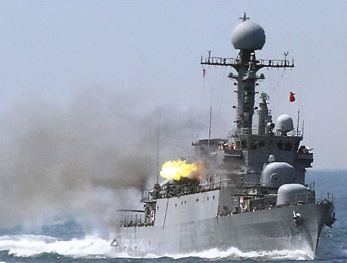Press Release

SEOUL -- North Korea's apparent torpedoing of a South Korean warship has weakened the political coattails of the South's pro-American president, according to the results of Wednesday's midterm elections.
Candidates supporting President Lee Myung-bak, who has worked closely with the Obama administration in responding to the ship's sinking, won six out of 16 races for metropolitan mayor and provincial governor, according to the National Election Commission.
The main opposition Democratic Party -- which accuses Lee of using the ship's sinking for political gain, and whose leaders have stridently criticized an investigation that blames the incident on North Korea -- won seven major races, returns showed.
About 48 percent of voters supported candidates from the Democratic Party and two other opposition parties, while 40 percent voted for candidates from Lee's ruling Grand National Party (GNP), according to the election commission. In midterm elections four years ago, GNP candidates won more than 50 percent of the vote.
In Seoul, the capital and largest city, Mayor Oh Se-hoon of the GNP won a narrow reelection victory, while independent candidates and small parties won the other major races.
Still, the Democratic Party claimed a victory. "The people handed a solemn judgment to the Lee Myung-bak administration," spokesman Woo Sang-ho said, calling the results a "public verdict against the Lee government's arrogance and self-righteousness."
A ruling party spokesman, Cho Hae-jin, said the GNP "humbly accepts the voice of the public expressed in this election." Analysts said the setback for the ruling party, which was unexpected, could lead to a leadership change.
Turnout was unusually high, nearly 55 percent, the highest for a non-presidential election in 15 years.
"The public sentiment to check the GNP and keep the balance seemed to have reduced the gap between the ruling and opposition parties," said Jeong Han-wool, executive director at the East Asia Institute, a Seoul-based research group. "The ship incident seems to have reinforced the existing conservative votes for the ruling party, but was not enough to change the minds of independent and left-leaning voters."
Even before the ship sank two months ago, killing 46 sailors and triggering a major international security crisis, Lee and his ruling party appeared likely to lose ground in nationwide voting to fill nearly 4,000 local positions.
An international investigation -- run by South Korea with the help of experts from the United States, Australia, Sweden and Britain -- determined two weeks ago that a North Korean mini-submarine fired a North Korean-made torpedo that ripped apart the 1,200-ton Cheonan in late March. Evidence showed overwhelmingly, the investigation said, that the North Korean military plotted to sink the ship.
As part of punitive measures against the North, Lee last week announced trade and transport sanctions, as well as anti-submarine exercises to be held with U.S. Navy ships in the Yellow Sea. Those exercises are scheduled to begin next week.
Recent polls had shown that most voters would take the Cheonan's sinking into consideration. They also showed that Lee's move to punish North Korea had majority support and that the president's popularity had risen from the mid-40s to just over 50 percent.
The main opposition Democratic Party, however, has accused Lee's party of manipulating news about the ship's sinking to win votes.
Special correspondent Yoonjung Seo contributed to this report.